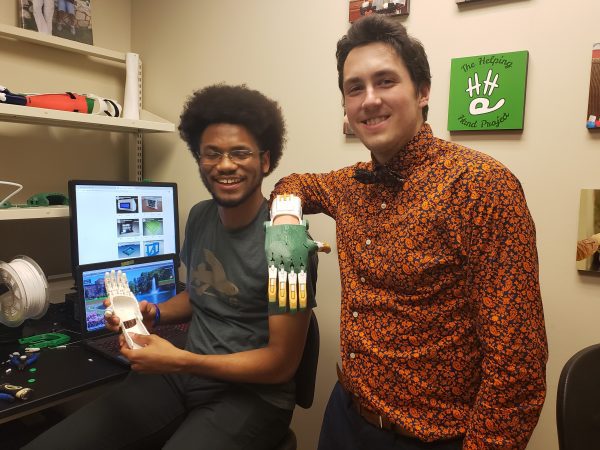Helping Hands

When Jackson Poulnott, a senior majoring in mechanical engineering technology, learned that young girls with limb differences wanted prosthetic hands with removable fingernails so they can change their nail color, he set out to make that happen. Poulnott is one of more than 100 undergraduate students who will be presenting their research Friday, July 26 at UNC Charlotte’s Summer Research Symposium. In addition to improving cosmetic features, he also has been working this summer in Dr. Richard Chi’s lab to improve the 3D-printed prosthetic device – the phoenix hand with wrist articulation – by creating a modified tension piece to allow independent functionality of the fingers. The new design will be released to open-sourced platforms and will be made available to worldwide chapters of The Helping Hands Project, a non-profit organization that provides low-cost prosthetics to children with upper limb differences. Irvin Naylor, a senior majoring in computer science, is working alongside Jackson in Chi’s lab. However, Naylor’s research focus is to address the 30-40% user abandonment of upper-limb prosthetic devices. Working closely with The Helping Hand Project, they found that initial training for a prosthetic device can be challenging and lead to abandonment, especially for children with congenital limb differences who are unfamiliar with new mechanical movements. Irvin is designing a computer game that will be integrated into the mechanical movements of the prosthetic devices to provide a fun and effortless process for learning to use prosthetic hands and arms. Poulnott and Naylor will be demonstrating their research projects and answering questions about their work at the Summer Research Symposium Friday, July 26 in the Barnhardt Student Activity Center. Poster Session A will be held from 10-11 a.m., and Poster Session B will be held from noon-1 p.m. The University’s Office of Undergraduate Research (OUR) is in its inaugural year and is hosting the research symposium. Its mission is to support undergraduate students through undergraduate research grants and opportunities to communicate their research to others through research symposiums, national conferences and research exploration events. Poulnott’s and Naylor’s research opportunities are made possible through their participation in Charlotte Community Scholars. Undergraduate students also are participating in research this summer through these organizations: Charlotte Research Scholars, SPIDURS (Summer Program to Increase Undergraduate Research), College of Computing and Informatics REU, Department of History Capitalism Initiative, Department of Mechanical Engineering REU, Making Future Communities REU, NanoSURE REU, NSF Criminal Justice REU, Undergraduate Research Class (BIOL 3900), and Charlotte Teachers Institute. A sample of the 103 posters to be presented at the research symposium include these student research projects: • Evaluating the biodiversity of restored salt marshes vs. natural salt marshes • Impacts of Participation in the Brain Architecture Game on Attitudes About Trauma Informed Care • Societal Costs and Benefits of AI Surveillance in the Context of Parking Lot Crime • Analyzing the Immunostimulatory Effects of Structurally Modified and Functionalized Nucleic-Acid Nanoparticles • New Thione Complexes of Silver with Potential Anticancer Properties • Security for Insecure Wi-Fi Calling • Numerical Analysis of Ocean Current Turbine Hydrofoil Designs to be Installed in North Carolina Shores • Transfer Student Success: More Support for Learning Communities • The Identification of Molecular Structures in New, Unique Hydrocarbons Through the Use of X-ray Crystallography • Machine Learning Application in Identifying Children at Risk for an Immunization Delay Pictured: Irvin Naylor (L) and Jackson Poulnott (R) By: Aimee Hawkins, Academic Affairs For More News, Notes and Updates, Follow us on TWITTER.